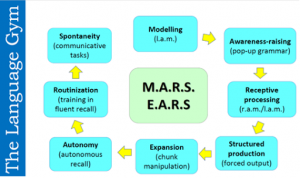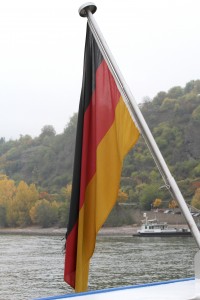Weobley High – Modern Foreign Languages
We are proud to be a high-achieving department at this school and are committed to helping you achieve your very best during your studies with us.
Our department has highly-qualified teachers in French and German and we teach both to GCSE level. Having the wonderful opportunity to study a new language is given to all of our students, as we firmly believe that studying a foreign language allows you to broaden your awareness of the world.
Talking in a different language lets you connect with people on their own terms. It makes for more enriching cultural experiences, and being able to communicate is the best feeling in the world! We try to stimulate your imagination, develop skills and knowledge that you can use in all of your other subjects and give you the ability to experience a little bit more when you go abroad.
Here’s something to consider – because learning another language requires lots and lots of remembering, studies have shown that bilinguals, when given tasks regarding memory, always score higher than those who can only speak one language! What’s not to like?
Our department comprises four members of staff:
Miss L Hickman: German and French; Subject Leader – MFL
Mrs A Price: German and French
Miss S Richardson: French; Form Tutor, Level 7 in Assessing and Teaching Learners with Dyslexia/Spld
Mrs K Watkins: French; Form Tutor
There are four dedicated language classrooms, all equipped with interactive whiteboards. Two also have a full suite of computers for individual student use, allowing learning in an excellent environment.
We encourage all our students to participate fully in lessons, no matter their abilities in languages. Having a positive learning experience in our lessons is crucial and careful planning ensures that we build student skills in listening, speaking, reading and writing. We concentrate not only on learning the language, but exploring the culture of the foreign country – you can also experience it for yourself by going on one of our regular visits to France and Germany.
Key Stage 3
All students learn French as the primary language at Weobley and approximately half of our students will also learn German. All students receive a solid grounding in grammar, vocabulary knowledge and we focus on skill development, allowing them to become more independent in their language learning. Although not compulsory at GCSE, most of our students continue their language studies at Key Stage 4.
Key Stage 4
French and German are offered at Key Stage 4 and students can always study two languages if they wish. All students follow the Edexcel GCSE course, using Edexcel’s own GCSE books for French and German. These resources are supplemented by a very large amount of up-to-date materials that we select from relevant websites.
Intent
In KS3 and KS4 our focus is on developing students’ communication skills through phonetics, vocabulary and grammar, interwoven using EPI methodology and matched to the National Curriculum. This new methodology encourages students to speak with confident pronunciation, master chunks of language and reinforces literacy skills in their first language to build up to autonomous use of the foreign language. Students listen to, speak, read, translate then write core phrases and are taught to manipulate grammar, which is interwoven through the curriculum. The recycling of key language and ‘Universals’ become the basis of building language to cope with real life situations and become competent linguists. Students will develop an extensive core of vocabulary and grammatical structures, which will be learned, regularly practised and retrieved so that students are confident communicators in a variety of contexts across all 4 language skills. Through a thorough and frequent exposure to the language of that topic or the communicative function, students will be able to pick up subtleties such as phonemes, syllables, Lexis, Grammar and syntax.
The curriculum builds on prior learning at KS2 by reinforcing vocabulary, basic grammar and transactional language and enables students to widen their understanding, knowledge and use of a variety of language. It also serves to enrich students’ use of their native language through comparison of the language and culture of another country. Differentiation, particularly for SEND, enables all learners to reach their full potential. By the end of KS3, students will understand what it is to be a multi-cultural linguist. We foster a curiosity in understanding different cultures and societies through reading, videos and careers, promote our love of travel in order for students to see the benefits of learning languages, and understand the ways in which languages are interconnected. In KS4 students will have the knowledge and understanding in their language learning to enable them to become global citizens. They will be able to apply what they know to both familiar and unfamiliar contexts from identity and culture to social issues and the world of Higher Education and work, to go on to achieve their potential, not just at A Level and in Higher Education but as global citizens living in a dynamic and interdependent world.
Implementation
Key Stage 3:
All Year 7 students are provided with the opportunity to study French (sets 3+4) or French and German ( sets 1+2). Students are setted in Year 7 based on their KS2 scaled scores and baseline assessments carried out in the transition period. A small group of students in Years 7 and 8 study French and Fresh Start (extra literacy skills). These students follow the same scheme of work but receive a condensed curriculum based on sentence builders and literacy intervention. At the end of Year 8, students can opt to specialise in one or two languages if they previously studied German.
French is the most prevalent language at Primary School but in some schools, German or Spanish lessons are taught. Year 7 schemes of learning build on any prior French knowledge. In the first term of Year 7, pupils learn the key grammatical ideas on which all languages are built. They are able to introduce themselves in the present tense, give opinions and talk about their classrooms and pencil cases. This allows students to learn how adjectives behave, and the importance of the genders of nouns. Students also learn about the infinitives and how verbs are conjugated, including common irregular verbs such as ‘to be’ and ‘to have’. This knowledge is essential in order to be able to access the Year 8 and 9 curricula, where students learn to describe events in the past and future as well as complex structures.
Lesson planning focuses on the development of all four skills: Listening, Reading, Speaking, and Writing, in addition to grammar, vocabulary and cultural knowledge. In our department, we use a range of strategies to ensure students learn in an enjoyable, positive and inclusive environment. All members of the department have attended training or have been trained in Dr Gianfranco Conti’s approach) of Extensive Processing Instruction (EPI). To enable our students to become successful language learners, we have reviewed our curriculum and created our own teaching resources to implement the EPI Mars’ ears principles into our lessons
These include:
Sentence builders in KS3 and some KS4 lessons,, enabling students to build accurate sentences with support.
Extensive drilling of chunks of language through LAM and RAM using engaging games and speaking activities.
Focus on listening and speaking skills at the start of every unit of work/sequence.
Use of texts that are at least 95% comprehensible (comprehensible input) to build fluency and to avoid cognitive overload.
Explicit teaching of language learning, decoding and parsing skill to support metacognition.
Regular ‘pop up’ Grammar sessions.
Systematic retrieval of knowledge to produce deep and durable learning.

Sequencing the curriculum is essential to generate deep and durable learning in Languages.Where possible we replicate the order by which children naturally acquire their first language. We therefore start in Year 7 by learning key phonics. The learning of these sounds is reinforced in every unit of work, when we introduce new Sentence builders/KOs.
Key Stage 4:
The GCSE curriculum is based on Edexcel Pearson GCSE in French and German, which focuses on 5 themes started in KS3 and interleaved across the 5 year scheme of learning:
Theme 1: Identity and culture:
Family, my friends, relationships with family and friends, marriage/partnership and me
Technology in everyday life, social media, mobile technology.
Free-time activities, music, cinema and TV, food and eating out, sport
Customs and festivals in German-speaking countries/communities
Theme 2: Local area, holidays and travel:
Home, town, neighbourhood and region, Travel and tourist transactions. Past and future holidays
Theme 3: School and education:
What is school like, school life
School activities/clubs, trips and exchanges.
Theme 4: Future aspirations, study and work:
Using languages beyond the classroom, Ambitions, Work/world of work
Theme 5: International and global dimension:
Bringing the worlds together – festivals, sporting events, charity work
Environmental issues
Impact
We have built our new 5 year scheme of learning to show progress in MFL across lessons, whole terms and across key stages. Regular interleaving and retrieval practice in lessons (often starters) measure short term and long-term progress. Formative assessment is then in the format of termly summative assessments and translation, vocabulary and quizzing high and low stakes tests, multiple-choice quizzes, effective questioning as well as through dialogic marking and whole class feedback. We want students to achieve mastery of the language and do this by retrieval practice, whole class feedback and redrafting and improving work based on feedback from the teacher. The 3 principles of language learning ‘Phonics, grammar and vocabulary are tracked throughout the year and formatively assessed at the end of each term and cumulatively at the end of the year in exam time. Data from the summative assessments is reported to the HOD in an editable long-term departmental spreadsheet for teachers to use, to review, inform the reporting system and reteach parts of the curriculum as appropriate.
Through EPI we are able to address and close gaps in knowledge, not just at the end of each topic but also during lessons to ensure students have a solid understanding before another structure or topic is taught. This may lead to classes starting topics in different weeks but we strive to ensure all students are secure in their understanding before moving on.
Engagement in MFL is measured through student voice, observations and a healthy uptake for GCSE. Students will hopefully be able to take part in visits abroad again from 2023 onwards, as well as to local universities and Birmingham Christmas Markets to see how languages work in real life. Conversations about travel and holidays throughout the school year will show students how they can easily apply their language skills to real life experiences. We hope that the diverse curriculum will develop confident and articulate linguists who want to discover more about the world around them.
NB: We have introduced the E.P.I methodology at KS3 in September 2021 – due to the Pandemic, it is not possible to objectively judge the impact on progress yet, however there is a noticeable improvement in what students can produce, the engagement, confidence and enjoyment from students.
We measure the impact of our curriculum in a variety of ways including:
- Learning walks/lesson observations and professional dialogue with teachers.
- Book Monitoring.
- Pupil engagement and teacher feedback.
- Interviewing pupils about their learning.
- Improved subject vocabulary.
- Pupil and teacher progress tracking.
- Attainment and achievement outcomes.
- Attendance and behaviour data.
- Evidence of wider cultural and intellectual enrichment.

